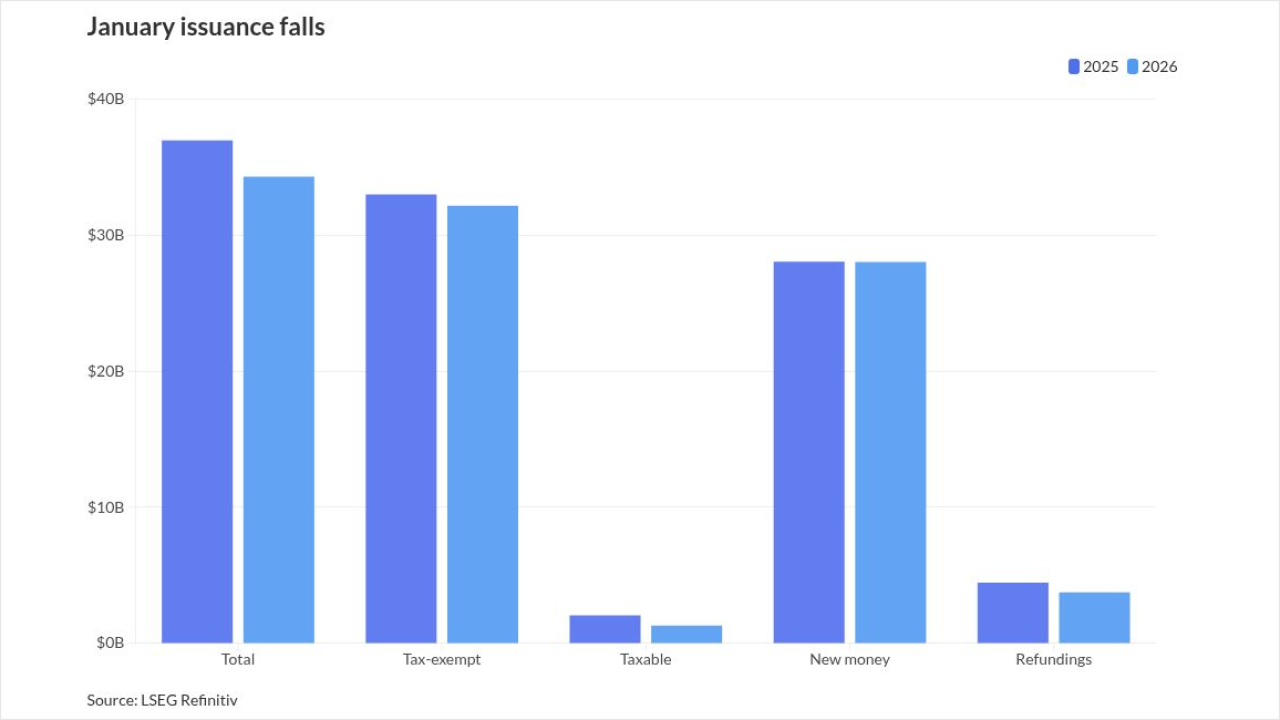Milwaukee received another rating downgrade as fiscal pressures led by rising pension costs mount.
Averting further rating erosion could depend on the city's success in lobbying the state government for fiscal help through the ability to levy a sales tax and/or increased state shared aid next year.
Moody's cut the city's general obligation rating on $1.2 billion of debt Thursday to A3 from A2. The city's sewer bond rating fell one notch A2 from A1 as a result, due to the strong governance connection between the city and sewer system and comingling of cash. The outlook on both is negative.

The downgrade "reflects the city's persistent structural deficits, compounded by its limited revenue-raising flexibility, extremely high leverage and fixed costs, and pension costs which are expected to grow significantly," Moody's said.
Analysts consider the city's operating reserves satisfactory, though they were helped by the conversion of short-term cash flow borrowing to a long-term note in 2020 with a 2030 maturity to take advantage of low interest rates.
While temporary federal pandemic aid has helped prop up the budget, additional revenue or spending cuts are needed to avert reserve use given strict state-imposed property tax caps.
"The negative outlook reflects the expectation that limited revenue-raising ability, coupled with high leverage and growing pension costs, will continue to place downward pressure on the city," Moody's said.
Comptroller Aycha Sawa, whose office manages debt issuance and has pressed the city administration to limit fund draws, acknowledged the pressures weighing on Milwaukee's ratings but said leaving a negative outlook on the rating goes too far.
"While we acknowledge the challenges the city is facing we believe that maintaining the negative outlook in addition to the downgrade does not accurately portray the city's ability and willingness to repay its existing and future debt obligations," Sawa said in a statement.
The city next GO bond sale is expected in November to fund capital work, according to Joshua Benson, who was promoted this year to capital finance manager from deputy comptroller to replace
The Moody's downgrade marks a return to
Ahead of a spring bond sale, Fitch Ratings and S&P Global Ratings affirmed their respective AA-minus and A ratings, noting that ARPA relief has eased operating pressures and improved some financial metrics. Both agencies assign negative outlooks.
The city's Moody's and S&P
Pensions loom large over city finances with payments expected to swell by a projected $50 million next year from the current $70 million when a new actuarially determined employer contribution will be set for the following five years. Some reports warn the payment could double.
A final number may not be known until a new experience study is completed in the fall. Mayor Cavalier Johnson's proposed budget will incorporate the new payment.
The pension system's last actuarial review reported a $1.3 billion unfunded liability and funded ratio of 80.7%.
A
One proposal would direct some collections to property tax relief while police and fire unions are pushing to include language barring personnel cuts. Some are advocating for folding new employees into the state's fully funded retirement system.
Pension obligation bonds could be on the table in a legislative package but the comptroller's office has stressed that it believes any borrowing must be tied to a broader reform package to warrant taking on the
"The ability to meet future pension contribution requirements while continuing to provide critical services will be a significant challenge absent new revenue sources or reductions in other expenditures," Moody's warned.
The city of 590,000 is working to build support for state legislative action on a local sales tax option that would benefit the city and county providing between $55 million and $60 million for the city. The city is seeking the ability to levy a tax while Milwaukee County which is empowered to levy a .5% sales tax is seeking a hike. Johnson also is pursuing more state shared aid.
The mayor is prioritizing "more positive relationships with senior elected officials in the state capitol" that has included meetings with top Republican leaders "in ongoing discussions regarding Milwaukee's financial predicament," Johnson said in a report on his first 100 days in office.
"The issue is reaching a crisis point, starting in the next budget the city will need to come up at least an extra $50 million annually to restore the pension system to 100% funded or eliminate approximately 25% of the city's jobs," Johnson said.
The former council president won a special election in April to serve out Tom Barrett's term after Barrett resigned to serve as U.S. ambassador to Luxembourg. State lawmakers don't return to work until January so action isn't imminent but the city's successful pursuit of the Republican National Convention in 2024 is viewed as helping its cause next year. The Republican National Committee last month announced the city's selection.
State shared revenues accounts for about 40% of general fund revenues with property taxes accounting for 30%. The city is operating this year on a $1.76 billion budget.
The city has built up to more than $80 million in a special fund to help manage future pension payments. Using ARPA to cover lost revenues and cover some operating expenses freed up tax levy dollars for reserves without violating ARPA rules that bar deposits into reserves. That help is expected to continue in the 2023 budget with $75 million of ARPA funds making up for pandemic-related revenue losses and could also extend into 2024.
With across-the-board negative outlooks, all three agencies that rate Milwaukee are watching.
"Failure to implement a new revenue stream at the next legislative session in January 2023 or sufficiently cut spending to close the budget gap could lead to a downgrade," Fitch has warned in the spring.
"Substantial increases in annual pension costs beginning in fiscal 2023 represent a looming challenge that will need to be addressed by city management to sustain the current rating level," S&P said in its April report.





